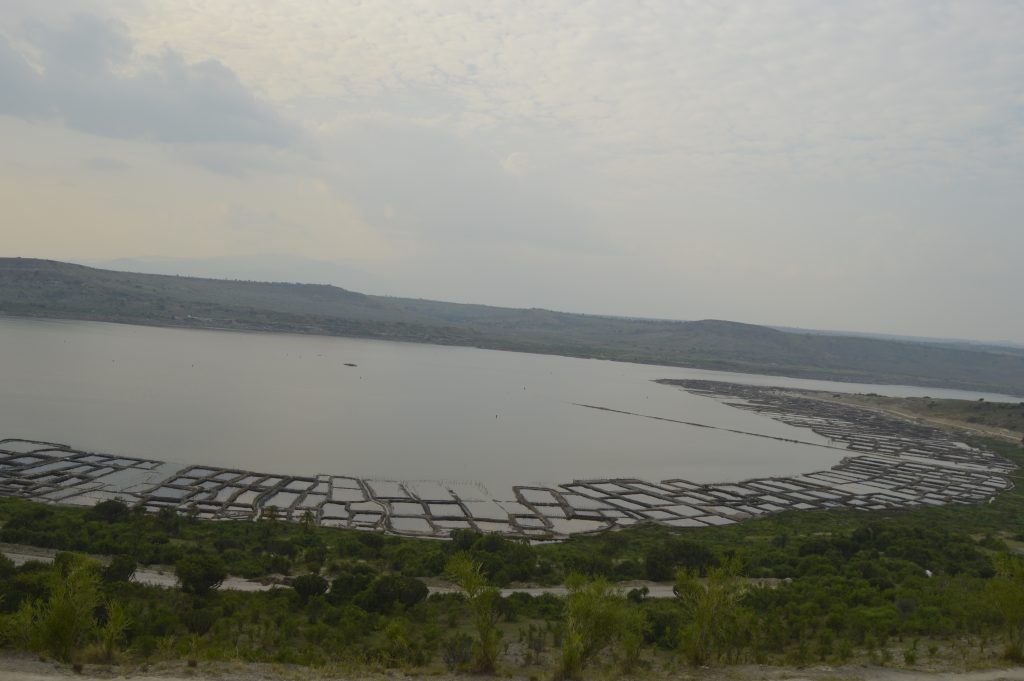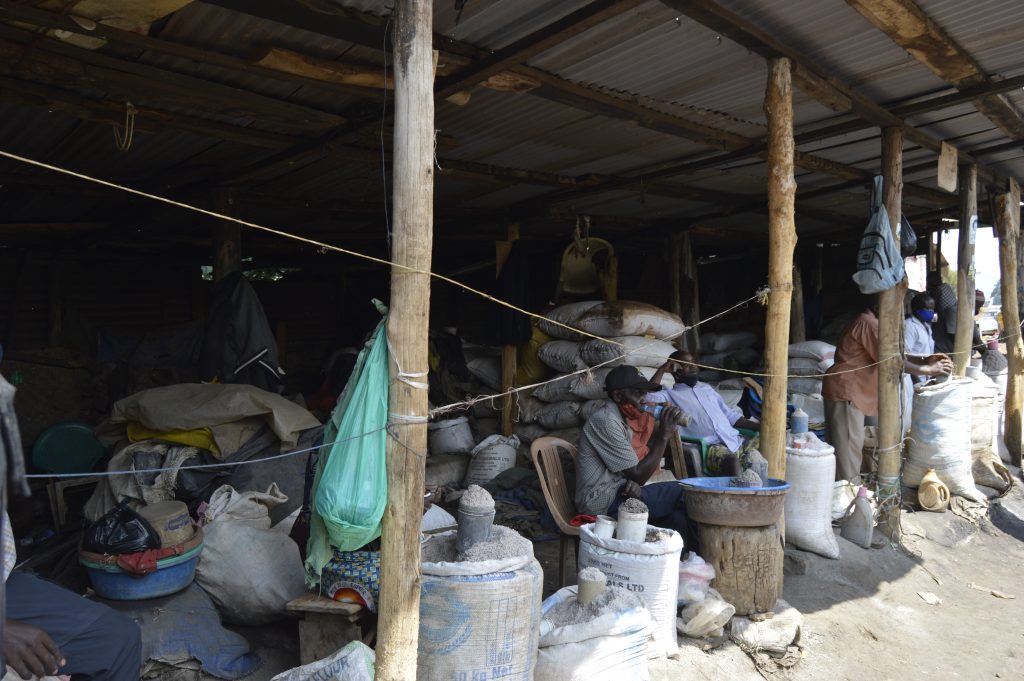By Innocent Kiiza
A stroll through the shores of Lake Katwe in western Uganda quickly shows that artisanal salt miners at Lake Katwe are not benefiting from their sweat. Working without protective gear, most of the artisans are reluctant to share their business secrets, let alone the challenges they face as they carry out business of mining Salt on the Lake.
On 29 June, I travelled to the Salt Lake in Katwe, Kabatoro town council in Kasese district, where I observed that salt is sold in sacks of 25kg as without weighting scales and then taken to different destinations across the country for use in various forms.

A Side view of salt lake in Katwe-Kabatooro town council, Kasese District. PHOTO by By Innocent Kiiza
At around 6:45am each day, trucks start to flock to the Salt Lake in Katwe from different destination for salt business.
According to salt Artisanal miners who engage in the business, the salt is weighed in sacks, with the smallest being a 25-kilogramme that is ordinarily sold at 25,000 shillings. However, due to the corona virus pandemic, it is sometimes sold at 30,000shillings to middle men, meaning the middle men too will bump the price to make more of this, as they sell too.
Salt sack for human consumption (grade one washed salt) of 25 kilograms’ is sold to middlemen at 25,000 shillings, while the middlemen in turn sell it 65,000 in Fort Portal market (farmers’ market) to traders while at customs border market in Mpondwe the salt goes for Shs100,000.
A sack of salt for drying hides and skins is sold to middle men at Shs15,000 and the same is sold to cattle keepers (in the cattle corridor) at 70,000 shillings, benefiting more than artisan salt miners.
A rock of animal salt for consumption is sold to middle men at Shs10,000 or Shs15,000, while they, in turn, sell it at Shs50,000 to livestock farmers, a price which benefits only middle men.
Meanwhile, with many needs waiting to be met by the inadequate income that the artisanal salt miners earn, most of them find it expensive to transport their produce (raw salt) from the lake direct to traders, cattle corridor buyers and livestock farmers, and Congolese buyers, so they opt for the little pay the middlemen offer for survival.
A Table showing Salt Type, Grade and its Purpose
| Salt type | grade | purpose | Sold price to middlemen |
| Ma-White | Grade one salt( first grade) | For Human Consumption | 25,000 shillings a 25kg sack |
| Ma-Black | Grade two salt | For skins and hides | 15,000 shillings a 25kg sack |
| Rock (rock stone like salt) | Grade three salt (lowest grade) | For Animal consumption | 10,000 or 15,000 shillings, According to the size |
Artisan Salt Miners testimonies
Mariette Kamuhanda, an artisanal salt miner at Lake Katwe as well as resident of Katwe, Kabatoro town council, wakes up early at 6:30 am like any other business person to get early customers for her goods, not knowing that she is cheated.
Kamuhanda, a mother of 3 children, who inherited a salt pan from her parents, extract over 150 sacks of 25kgs of Raw salt in a good season, which is the sunny season, where extracted salt receives enough sun shine and dry well and about 80 to 90 sacks of 25kgs during the rainy season, which she says is always a bad season for salt mining, where rain fall dissolve cry staled salt when rain hits it.
According to Kamuhanda, the salt business has enabled her to provide for her children and construct a three- room house for her family, which she calls an achievement.
But could Kamuhanda have achieved even more than she has if she had been able to sell her raw salt directly to buyers – not to middle men?
Kamuhanda who is 43years old now said she inherited the salt pan aged 20years and since she has been doing salt business, where she learnt to do the salt business by dealing with middlemen for her produce.
However, she said that what she was getting from her salt pan couldn’t meet her needs, so she also started buying salt from other artisanal miners to boost her income.
“I specialized in buying only rock animal salt which had more market on top of my salt pan where I harvest grade one washed salt for human consumption to boost my earning,” Kamuhanda said.
She said she buys a 25 kg bag of animal salt at 10,000 shillings and sells it to the middlemen at 15,000 shilling, earning 5000 shillings from each bag.
Ahmed Kasangaki, who is an agent at Salt Lake Katwe, who buys salt on behalf of the middle man, said middlemen benefit a lot from the salt business, adding that a bag of salt which is bought at Salt Lake at 25,000 shillings is sold at 60,000 to 100,000 shillings, according to the season in different markets, which is like double the profit for the middlemen.
He added that he used to stock salt during the sunny season, where production is high and sell it expensively in the rainy season for much higher profits, where the salt production at the lake is low during that time.
“Here business is too much during the sunny season when salt production is too much and those with warehouses stock it and make a lot of money in the rainy season, when business slows down and yet demand is high,” Kasangaki said
Ernest Kakuru, a salt miner owns 2 salt pans where he harvests 300 to 450 sacks of 25kgs every sunny season, and sells most of his salt to middlemen who take it to Ankole and other cattle corridor places like Rwanda and Burundi.
” I get 2 to 3 million shillings in a good season and I have been able to construct and complete my family house,” Kakuru says with smile.
Unlike most artisanal salt miners, Kakuru thinks middle men make a lot of money from slat mining to the extent that he is planning to start taking his produce directly to buyers once he acquires himself a van for transportation.
He added that he is working hard to see that he buys a truck and starts transporting his salt direct to livestock farmers, adding that his 2 salt pans are enough for him to become a distributor or an agent.
“I am looking forward to acquiring a bank loan and getting a transporting truck and becoming a distributor because I have already establishing contacts with direct buyer,” Kakuru said.
MIDDLEMEN AND WOMEN TRADERS SAY
Musa Kasule, a middleman, says that for 13 years now he has traded in salt business, the culture within the Katwe area is that each middleman comes with his price according to where he takes the salt too.
He said that some people who deal in human salt (washed grade one salt) come with different prices and those dealing in animal salt also trade on different price.
Kasule explained that miners are not cheated but it’s the salt grade which determines the price, attributing that the salt for hides and skins is priced differently from the black row salt for animal consumption.
However, he added the price is determined according to distance, those selling salt in nearby markets can’t sell like we who travel distances to acquire good markets in neighbourhood. Actually, the longer the distance you travel the better the market, according to Kasule
“Look, I am taking this salt to Kampala for good market, it doesn’t matter where I get it from, how much I bought it but is the price I need out of it,” Kasule said.

He said he goes in to cost from the time salt is extracted up to loading and offloading where he pays those extracting it from salt pans, who’s carrying the sack from the truck and those who load it onto the truck.
When asked how much he sells a sack after buying it from the salt miner at 25,000 shillings, Kasule was careful not to mention the amount but lamented that the business is not as beneficial as most people may think.
Juliet Biira, a salt agent to Congolese at Kasindi border market, says business is not like it used to be because of the corona virus pandemic, adding that procurement processes are all now done by phone.
“Congolese used to come and we interact person-to-person for business a deal which is no longer the issue now but still business is going on by phone,” Biira said.
Biira couldn’t reveal how much she sells the salt sack to her Congolese counterpart but in the middle of the interview, she received a business call which was actually from Democratic Republic of Congo (DRC), and she started negotiating prices for her salt.
According to phone conversation I heard words like” wunyitwireko okwamitwalu ekiminthanu wunyiwulaye okwamitwalu ekumi,” Meaning, (“Reduce for me from 150,000 to 100,000 shillings”).
Leya Mugarra, 56 years old and a mother of 6 children, a trader at Mpanga market in Fort Portal, said the salt business has done wonders for her personal life, because she has educated her children up to university level, having started this business in her 20’s.
“This job has educated my children up to university and they have their jobs too plus sheltering them, so it’s a nice job amidst health challenges like salt rocks wounding you sometimes,” Mugarra said
She buys the human salt for consumption (washed grade one) at good price which she didn’t mention but she reveals that sells it at 100,000 to 150,000shillings and animal salt (rock salt) for consumption buys it at 25000 and sell it at 60,000 to 70,000 shillings, depending on the season.
Mugarra added that she used to go direct to Katwe herself but since she is becoming weak, she buys from middlemen at a price she called substantial.
Rashid Abasi, a salt trader in Mpanga Market in Fort Portal said that business has been affected covid-19 since customers who used to come from other cattle corridor districts like Kyenjojo, Kamwenge are no longer coming.
WHAT LEADERS SAY
According to the leaders both at the local level and district levels, they believe that middlemen eat a lot from the artisanal salt miners sweat but they have no ways to combat the ongoing exploitation of the local miners.
Didas Sekiyunga, a salt miner who doubles as a treasurer of lake Katwe Kabatoro salt miners’ cooperative, said before the salt miners formed this cooperation, middlemen were eating big from the artisanal miners’ sweat to the extent that salt was sold at a very low price of 5000 shillings a 25kg sack and sometimes middlemen could even fail to payback after they had sold the salt that they had taken it on credit.
He added that after such challenges, salt miners and those who own salt pans came together and formed this cooperative to regulate who should be middlemen and traders.
Sekiyunga explained that after finding out that middlemen gain a lot from their sweat cheating them to 50% from artisanal miners in terms of transport, revenue and license but in actual sense these costs couldn’t led to benefit on behalf of artisanal miners.
“You see we discovered that a kilogram of animal salt could be bought here at 800 shillings but be sold to livestock farmers at 25000 to 28000 shillings, a price which benefits only middlemen,” Sekiyunga said.
He added that this price is determined during the negotiation between the middleman and the livestock farmers, whereby he can bump up the price any time because it’s not fixed.
The principal Town Clerk, Catherine Mbambu, said it’s true they have discovered that middlemen cheat a lot the artisanal salt miners out of absence of weighing scale, adding that middle men could come with sack which are bigger in size than those of the artisanal miners of 25 kilograms, but then middleman will insist its 25kilogramms.
“We are planning to buy a double type of weighing scale which a bit expensive as town council and streamline the salt business so that both middlemen and artisanal salt miners benefit from the business,” Mbambu said.
She added that on top of the double type of weighing scale, the council is in planning to put up even Weigh Bridge for trucks in this financial year after passing it in council after president allowing back the gathering.
Mbambu said that at some point the artisanal miners see their salt pans as everything which won’t go anywhere and don’t mind whether they have made much out of it or not.
“We did an assessment in the month of March aimed at how much the production of salt goes to artisanal miners amidst the rainy season and found that just in a period of one month of March salt miners got 617,909,000 million and this showed us that if the business is streamlined, salt artisanal miners could get more than this as well as revenue collection could be boosted too,” Mbambu added.
The mayor of KatweKabatoro town council, Abooki John Bosco Kananura, said that when he came to office in 2016 after winning an election, a bag of 25 kilogram of salt was at 3000 and his office and council decided to bring together salt miners in corporative to have same voice, where they could negotiate and agree on common price ,which they did as measure that is where the price is now at 25000 shillings a bag, however it’s still small and some artisanal miners still negotiate with middle men out of the cooperative.
“Even if it’s also small but not like it used to be,” he said. “Our local people have been always being let down by we the politicians.”
He added that some interventions have been made to bring artisanal salt miners together so that they can stand a chance to earn better incomes when they take salt straight to better markets than selling the salt at source.
“I developed a salt business concept and gave it to Gen. Saleh [the head of Operation Wealth Creation] on how this salt business can be brought to life and boost the livelihoods of the people living around Lake Katwe and in Kasese but we are still waiting for the kick off of the agri-led project implementation,” Kananura said
Kananura added that his aim is to allow artisanal salt miners to be able to get loans and start to take salt to cattle corridors districts in Uganda, as well as to Rwanda and DRC where there is a better market than being cheated of their hard-earned salt by middlemen.




























